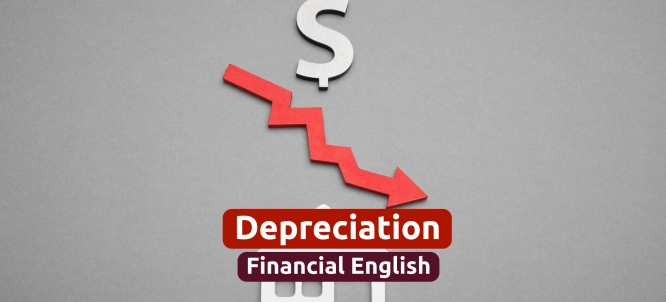by PushtoLearn
Depreciation
Table of Contents
Depreciation Exercises and Flashcards
These exercises and flashcards focus on Depreciation
Vocabulary List for Depreciation
1. Assumption (noun)
Definition: A principle or condition accepted as true for the purpose of financial reporting.
Example: The assumption that assets lose value over time is fundamental to depreciation.
Explanation: Assumptions guide accounting practices and ensure consistency in financial reporting.
2. Business Entity (noun)
Definition: An organization established as a distinct legal and financial unit.
Example: Depreciation is calculated based on the assets owned by the business entity.
Explanation: This term is essential for distinguishing between personal and business assets.
3. Separate (adjective)
Definition: Independent or distinct from other entities or components.
Example: Depreciation calculations treat each asset as a separate item.
Explanation: Separating assets ensures precise tracking of their value and costs.
4. Time Period (noun)
Definition: A specific duration for which financial activities are reported.
Example: Depreciation is recorded for each time period, such as a fiscal year.
Explanation: The time period principle aligns depreciation with consistent reporting intervals.
5. Continuity (noun)
Definition: The assumption that a business will continue operating indefinitely.
Example: The continuity of the business justifies spreading asset costs over multiple years.
Explanation: This concept underpins the use of long-term asset depreciation.
6. Consolidated (adjective)
Definition: Combined financial statements representing multiple entities as one.
Example: The consolidated balance sheet includes depreciation from all subsidiaries.
Explanation: Consolidation ensures a comprehensive view of a business’s financial position.
7. Subsidiary (noun)
Definition: A company controlled by another (the parent company).
Example: The parent company recorded the subsidiary’s depreciation in its accounts.
Explanation: Tracking depreciation for subsidiaries contributes to accurate consolidated statements.
8. Current (adjective)
Definition: Relating to the present or within a short time frame, such as a fiscal year.
Example: Depreciation expenses appear in the current financial statements.
Explanation: Current reports include depreciation to reflect real-time asset value changes.
9. Wear Out (verb)
Definition: To deteriorate due to regular use over time.
Example: Machinery wears out and loses value, leading to annual depreciation.
Explanation: Wear and tear is a primary reason for calculating depreciation.
10. Obsolete (adjective)
Definition: No longer useful or up-to-date due to advancements or changes.
Example: Computers quickly become obsolete, requiring higher depreciation rates.
Explanation: Obsolescence accelerates the loss of asset value and affects depreciation schedules.
11. Fixed (adjective)
Definition: Relating to assets that are long-term and not easily converted to cash.
Example: Fixed assets like buildings and equipment are subject to depreciation.
Explanation: Understanding fixed assets is key to distinguishing them from current assets.
12. Unusable (adjective)
Definition: No longer functional or fit for its intended purpose.
Example: The vehicle became unusable after several years, leading to its full depreciation.
Explanation: Unusable assets signal the end of their useful life.
13. Out of Date (adjective)
Definition: No longer current or relevant, often due to technological advancements.
Example: Out-of-date machinery is written off through accelerated depreciation.
Explanation: Depreciation accounts for assets losing value due to becoming outdated.
14. Eventual (adjective)
Definition: Occurring at some future point.
Example: The eventual disposal of the asset was included in the depreciation calculation.
Explanation: Depreciation schedules anticipate the eventual decline and disposal of assets.
15. Depreciation (noun)
Definition: The systematic allocation of an asset’s cost over its useful life.
Example: Annual depreciation was applied to the company’s fleet of vehicles.
Explanation: Depreciation ensures that the cost of assets is matched with the revenue they generate.
16. Appreciate (verb)
Definition: To increase in value over time.
Example: Unlike most equipment, the land appreciated instead of depreciating.
Explanation: Understanding appreciation is essential for distinguishing it from depreciation.
17. Gain (noun)
Definition: The profit earned from selling an asset for more than its book value.
Example: The company reported a gain after selling fully depreciated equipment.
Explanation: Gains reflect the financial benefit of disposing of assets above their depreciated value.
18. Revalue (verb)
Definition: To reassess the worth of an asset.
Example: The company revalued its property to reflect market conditions.
Explanation: Revaluations impact depreciation schedules and financial statements.
19. Appreciation (noun)
Definition: An increase in the value of an asset over time.
Example: Appreciation of real estate offset the depreciation of equipment.
Explanation: Balancing appreciation and depreciation helps assess overall asset value.
20. Market Value (noun)
Definition: The current worth of an asset in the marketplace.
Example: The machine’s market value dropped below its book value due to depreciation.
Explanation: Market value is a benchmark for evaluating the reasonableness of depreciation.
21. Accelerate (verb)
Definition: To increase the rate or speed of a process.
Example: The company used accelerated depreciation for tax benefits.
Explanation: Accelerated depreciation reduces asset value faster, aligning with rapid obsolescence.
22. Incentive (noun)
Definition: A benefit or motivation to encourage a specific action.
Example: The government provided a tax incentive for accelerated depreciation.
Explanation: Incentives can encourage businesses to invest in certain types of assets.
23. Allowance (noun)
Definition: A permitted deduction or reduction for a specific purpose.
Example: A depreciation allowance was applied to the company’s new equipment.
Explanation: Allowances ensure that asset costs are fairly distributed over their useful life.

Wordlist for Depreciation, Professional English in Use - Finance
|
Word |
Definition |
Example |
|
|
assumption |
a belief or supposition made without complete proof or evidence, often used as a basis for decision-making or analysis |
The plan was based on the assumption that the schedule could be substantially speeded up by adding more people |
|
|
business entity |
an organization or entity engaged in commercial, industrial, or professional activities for the purpose of generating profits or achieving other business objectives |
There are various types of business entities: sole proprietorship, partnership, LLC, corporation |
|
|
separate |
distinct or independent from something else, not connected or combined |
Are they divorced? No, but they plan to separate for a while |
|
|
time period |
a specific duration or interval of time, often used to measure or describe a certain span of time |
Ancient history refers to the time period in which scientists have found the earliest remains of human activity, approximately 6,000 BC |
|
|
continuity |
the quality of being continuous or uninterrupted, often used in reference to the ongoing existence or operation of something over time |
There was good continuity between teachers |
|
|
consolidated |
combined or merged into a single entity, typically used in financial reporting to refer to the financial results or statements of a group of related companies |
A company listed on the stock exchange has to publish its consolidated financial reports every three months |
|
|
subsidiary |
a company that is owned or controlled by another company, often referred to as the parent company or holding company |
A company which is more than 50% owned by another company is called a subsidiary |
|
|
current |
belonging to the present time or period, often used to refer to assets, liabilities, or events that are expected to be settled or resolved within a short time frame |
Do you think it's better to stay in my current position? |
|
|
wear out |
to become worn or exhausted through use or time, often used to refer to the depreciation or reduction in value of assets or resources over time |
To wear out means to no longer work properly because it has used too much |
|
|
obsolete |
no longer in use or relevant, outdated or outmoded |
A new technology being developed by AT&T could make your business cards obsolete |
|
|
fixed |
stable or permanent in nature, not subject to change or fluctuation |
The contract is for a fixed period of three years |
|
|
unusable |
непридатний для використання |
This device is completely unusable |
|
|
out of date |
no longer current or relevant, not up-to-date or obsolete |
I'm out of date about Flora. What's she doing now? |
|
|
eventual |
likely to happen or occur in the future, eventual or possible outcome or result |
Our eventual aim is to design better products |
|
|
depreciation |
a decrease in the value of an asset over time, often due to wear and tear, obsolescence, or other factors |
A depreciation of the dollar would make US exports cheaper especially to Japan |
|
|
appreciate |
to increase in value over time, often used in reference to investments or assets |
Our house appreciated by 20% in two years |
|
|
gain |
an increase in value or profit, often used in financial contexts to refer to positive financial results or returns |
Oil prices rose again today after yesterday's gains |
|
|
revalue |
to assign a new value to something, often used in accounting or financial reporting to adjust the value of an asset or liability |
The company's assets are periodically revalued |
|
|
appreciation |
an increase in value or worth, often used in reference to the positive change in the value of an investment or asset |
He did this in appreciation of the help that he had received |
|
|
market value |
the current price or estimated worth of a financial instrument, property, or investment in the open market |
Compensation should be paid based on replacement, not market value |
|
|
accelerate |
to increase in speed or intensity, often used in reference to the growth or progress of something |
As such, we must accelerate efforts in that regard and strive to make as much progress as possible in the remaining period |
|
|
incentive |
a motivating factor or reward that encourages or influences behavior, often used in reference to financial or non-financial incentives |
As an incentive to economy, the contractor receives a bonus if the final cost is less than the target price |
|
|
allowance |
a sum of money or other benefits provided on a regular basis, often used to refer to regular payments made to individuals or organizations for specific purposes |
Employees relocating to London receive a maximum allowance of £1000 a year |
|
FAQ
Why is depreciation important in accounting?
Depreciation allows businesses to allocate the cost of long-term assets over their useful life, matching expenses with revenue generated by the assets.
What is the difference between appreciation and depreciation?
Appreciation refers to an increase in an asset’s value, while depreciation refers to a decrease in value over time due to usage, wear, or obsolescence.
What is accelerated depreciation?
Accelerated depreciation is a method that allocates more depreciation expense in the early years of an asset’s life, often for tax benefits.
How is market value related to depreciation?
Depreciation reduces an asset’s book value over time, while market value reflects its current worth in the marketplace, which may differ.
What are depreciation allowances?
Depreciation allowances are deductions permitted by tax authorities to account for asset value loss, reducing taxable income.

